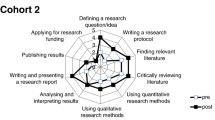Abstract
In terms of curriculum development, it is important for faculties to set up a learning environment that supports activities that facilitate the achievement of the intended learning outcomes. This study explores perspectives from medical students and faculty on the benefits of undergraduate research experiences. Thematic analyses of interview data from 18 students and 11 faculty members indicated that transferable skills (e.g., active learning and critical appraisal) were commonly perceived as benefits of undergraduate research (UR) by students (28.6%) and faculty members (35.5%). On the other hand, the most commonly identified benefit of UR among students was research-specific skills (e.g., conducting rigorous experiments and designing a study) (39.7%) and knowledge (22.2%). Faculty members intended to enhance students’ attitudes toward research during UR (e.g., having an inquisitive mind and being research-minded) (50.9%). This study demonstrates that this perception gap is caused by the students’ perceptions of research and faculty members’ difficulties in engaging students during research through mentorship. Therefore, students and faculty members need to thoroughly discuss how they engage mutually, negotiate common purposes, and develop resources for UR. It should be noted that institutional support for mentoring relationships such as offering more opportunities where the faculty members can discuss the best pedagogical approach in UR with others across departments and institutions is key to aligning teaching for constructive learning.
Similar content being viewed by others
References
Wenzel TJ. What is undergraduate research? Counc Undergrad Res Q. 1997;17:163.
Kuh GD. High-impact educational practices: what they are, who has access to them, and why they matter. Washington DC: Association of American Colleges and Universities; 2008.
Zimbardi K, Myatt P. Embedding undergraduate research experiences within the curriculum: a cross-disciplinary study of the key characteristics guiding implementation. Stud High Educ. 2014;39(2):233–50.
Chang Y, Ramnanan CJ. A review of literature on medical students and scholarly research: experiences, attitudes, and outcomes. Acad Med. 2015;90(8):1162–73.
Laidlaw A, Aiton J, Struthers J, Guild S. Developing research skills in medical students: AMEE Guide No. 69. Med Teach. 2012;34(9):754–71.
Dekker FW. Science education in medical curriculum: teaching science or training scientists? Med Sci Educ. 2011;21:258–60.
Lopatto D. Survey of undergraduate research experiences (SURE): first findings. Cell Biol Educ. 2004;3:270–7.
Burgoyne LN, O’Flynn S, Boylan GB. Undergraduate medical research: the student perspective. Med Educ Online. 2010;15(1):5212.
Imafuku R, Saiki T, Kawakami C, Suzuki Y. How do students’ perceptions of research and approaches to learning change in undergraduate research? Int J Med Educ. 2015;6:47–55.
Knight SE, Van Wyk JM, Mahomed S. Teaching research: a programme to develop research capacity in undergraduate medical students at the University of KwaZulu-Natal, South Africa. BMC Med Educ. 2016;16:61.
Linn MC, Palmer E, Baranger A, Gerard E, Stone E. Undergraduate research experiences: impacts and opportunities. Science. 2015;347(6222):1261757.
Hunter AB, Laursen SL, Seymour E. Becoming a scientist: the role of undergraduate research in students’ cognitive, personal, and professional development. Sci Educ. 2007;91(1):36–74.
Zydney A, Bennett J, Shahid A, Bauer K. Faculty perspectives regarding the undergraduate research experience in science and engineering. J Eng Educ. 2002;91:291–7.
Hanauer DI, Frederick J, Fotinakes B, Strobel SA. Linguistic analysis of project ownership for undergraduate research experiences. CBE Life Sci Educ. 2012;11(4):378–85.
Biggs J, Tang C. Teaching for quality learning at university – what the student does. Berkshire: Open University Press; 2011.
Biggs J. Aligning teaching for constructing learning. York: Higher Education Academy; 2003. https://www.heacademy.ac.uk/knowledge-hub/aligning-teaching-constructing-learning. Accessed 12 Jun 2018
Oliveira CC, de Souza RC, Abe ÉHS, Móz LES, de Carvalho LR, Domingues MA. Undergraduate research in medical education: a descriptive study of students’ views. BMC Med Educ. 2014;14:51.
Kharraz R, Hamadah R, Alfawaz D, Attasi J, Obeidat AS, Alkattan W, et al. Perceived barriers towards participation in undergraduate research activities among medical students at Alfaisal University—College of Medicine: a Saudi Arabian perspective. Med Teach. 2016;38(sup1):S12–8.
Braun V, Clarke V. Using thematic analysis in psychology. Qual Res Psychol. 2006;3:77–101.
Healey M, Jordan F, Pell B, Short C. The research-teaching nexus: a case study of students’ awareness, experiences and perceptions of research. Innov Educ Teach Int. 2010;47(2):235–46.
Houlden RL, Raja JB, Collier CP, Clark AF, Waugh JM. Medical students’ perceptions of an undergraduate research elective. Med Teach. 2004;26(7):659–61.
Lopatto D. The essential features of undergraduate research. Counc Undergrad Res Q. 2003;24:139–42.
Behar-Horenstein LS, Roberts KW, Dix AC. Mentoring undergraduate researchers: an exploratory study of students’ and professors’ perceptions. Mentor Tutor Partnersh Learn. 2010;18(3):269–91.
Pfund C, Pribbenow CM, Branchaw J, Lauffer SM, Handelsman J. The merits of training mentors. Science. 2006;311(5760):473–4.
Imafuku R, Nishiya K, Saiki T, Okada H. Online and face-to-face: developing an inter-university undergraduate research. Med Sci Educ. 2018;28(1):5–6.
Imafuku R, Saiki T, Suzuki Y. Developing undergraduate research in Japanese medical education. Counc Undergrad Res Q. 2016;37(1):34–40.
Willison J, O’Regan K. Commonly known, commonly not known, totally unknown: a framework for students becoming researchers. High Educ Res Dev. 2007;26(4):393–409.
Healey M, Jenkins A. Developing undergraduate research and inquiry. York: The Higher Education Academy; 2009. https://www.heacademy.ac.uk/knowledge-hub/developing-undergraduate-research-and-inquiry. Accessed 21 Mar 2018
Wenger E. Communities of practice: learning, meaning, and identity. Cambridge: Cambridge University Press; 1998.
Funding
This paper was financially supported by JSPS KAKENHI Grant-in-Aid for Young Scientists (B) Number 17K15741.
Author information
Authors and Affiliations
Corresponding author
Ethics declarations
Competing Interests
The authors declare that they have no competing interests.
Ethical Approval and Consent to Participate
This work was granted by the Institutional Review Board at Gifu University (25-360).
Additional information
This study was undertaken as part of undergraduate research in medical education in 2017. SY, KH, DM, YO and KY were third-year medical students at Gifu University at the time of this investigation.
Rights and permissions
About this article
Cite this article
Imafuku, R., Yasuda, S., Hashimoto, K. et al. Exploring Medical Students’ and Faculty’s Perspectives on Benefits of Undergraduate Research Experience. Med.Sci.Educ. 28, 553–560 (2018). https://doi.org/10.1007/s40670-018-0593-7
Published:
Issue Date:
DOI: https://doi.org/10.1007/s40670-018-0593-7




